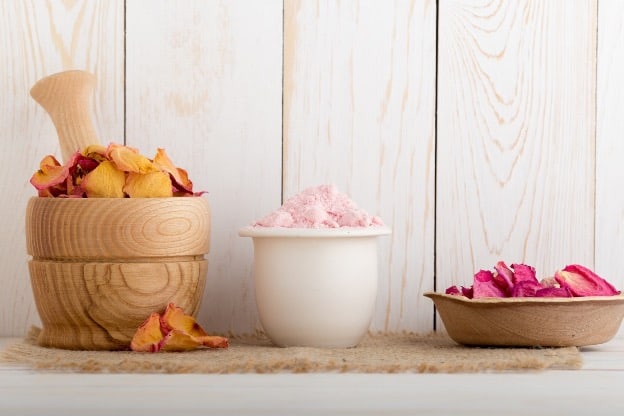Ayurveda is an ancient system of medicine that focuses on achieving balance and harmony within the body and mind. At the heart of Ayurveda are the doshas, or the three primary energies that govern our physical and mental functions.
By understanding your unique dosha, you can gain insight into your strengths and weaknesses and make choices supporting your overall health and well-being.
In this blog, we’ll explore the three doshas, their characteristics, and how you can use this knowledge to optimize a healthier lifestyle.
Get ready to unlock the secrets of healthy living with Ayurvedic Doshas!
Ayurveda Doshas For Health and Well-being
One of the fundamental principles of Ayurveda is the concept of doshas, which are the three energies that govern the body and mind. These doshas are Vata, Pitta, and Kapha; each individual has a unique combination of these energies that make up their Ayurvedic constitution.
Knowing your dosha can significantly improve your health in several ways, including
Understanding your unique body type
When you know your dosha, you can better understand your unique physical and mental characteristics, strengths, and weaknesses. This understanding lets you make informed decisions about your lifestyle, diet, exercise, and overall health and wellness.
Balancing your dosha
Ayurveda believes that imbalances in doshas lead to health issues. Knowing your dosha can help you identify imbalances in your body and mind and take appropriate steps to balance them.
For example, you may experience anxiety, dry skin, and constipation if you have a Vata imbalance. Ayurvedic treatments, such as specific herbs, oils, or massages, can help balance Vata and alleviate these symptoms.
Eating for your dosha
Ayurvedic diet recommends eating according to your dosha to promote optimal digestion, absorption, and assimilation of nutrients. For example, if you are predominant Pitta dosha, you may benefit from a cooling diet with sweet, bitter, and astringent tastes to balance the fiery nature of Pitta.
Lifestyle changes
Ayurveda emphasizes the importance of a balanced lifestyle that promotes health and wellness. Knowing your dosha can help you make lifestyle changes that suit your unique constitution, such as incorporating specific yoga paths and poses, meditation techniques, and daily routines.
Ayurvedic Diet: Eating for Your Dosha
Ayurvedic diet is a key aspect of Ayurvedic medicine that emphasizes the importance of eating whole, fresh, and nourishing foods suitable for an individual’s dosha or Ayurvedic constitution.
Here are some general guidelines for Ayurvedic eating for your dosha:
Vata Dosha
Vata is characterized by qualities such as dryness, lightness, and coldness. People with a Vata dosha tend to have irregular metabolism and a thin body frame and experience anxiety, constipation, and dry skin.
To balance Vata, you should eat warm, moist, and grounding foods, root vegetables, warm soups, stews, and only cooked grains. You can also include healthy fats, such as ghee and sesame oil, and warming spices, such as ginger and cinnamon.
Pitta Dosha
Pitta is characterized by heat, intensity, and sharpness. Pitta dosha people tend to have a medium body frame, strong digestion, and experience acidity, inflammation, and skin rashes.
To balance Pitta, you need to eat cooling, sweet, and bitter foods, such as fresh fruits and vegetables and whole grains. Avoid spicy, sour, and salty foods, and use cooling spices like coriander and fennel.

Kapha Dosha
Kapha is characterized by heaviness, slowness, and stability. If you are with a Kapha dosha, you tend to have a slow metabolism and heavy body frame and experience weight gain, congestion, and lethargy.
To balance Kapha, people need to eat warm, light, and spicy foods, such as steamed vegetables, lentils, and spices such as black pepper and ginger. They should also limit high-fat, oily foods and focus on incorporating bitter and astringent tastes.
Managing Stress According to Ayurveda Doshas
Managing stress according to your dosha can help you achieve balance and maintain optimal health. Here are some Ayurvedic tips for stress relief based on your dosha:
Vata Dosha
If Vata Dosha is vitiated,, you may be prone to anxiety, restlessness, and insomnia when stressed.
To manage stress,
- Follow a routine
- Eat warm and grounding foods, and avoid caffeine and sugar
- Practice gentle yoga and meditation
- Use calming essential oils like lavender, sandalwood, or rose
Pitta Dosha
If Pitta Dosha is vitiated, you may experience irritability, anger, and frustration when stressed.
To manage stress,
- Stay calm and avoid overheating
- Eat cooling foods such as fully-ripe juicy fruits
- Avoid spicy or fried foods
- Practice calming activities like swimming or walking in nature and
- Use soothing essential oils like peppermint or chamomile
Kapha Dosha
If Kapha Dosha is vitiated, you may feel lethargic, depressed, and unmotivated when stressed.
To manage stress,
- Stay active and avoid oversleeping or sleeping during the day
- Eat light and energizing foods like fruits and vegetables
- Avoid heavy or oily foods
- Practice invigorating activities like hiking or dancing
- Use uplifting essential oils like lemon or grapefruit
In addition to these tips, Ayurveda recommends practicing pranayama or breathing exercises, to calm the mind and reduce stress. You can try abdominal breathing, alternate nostril breathing and ujjayi breath for a few minutes daily to promote relaxation and balance your doshas.
It’s always best to consult with an Ayurvedic practitioner to determine your unique dosha and receive personalized recommendations for stress management.
How Ayurvedic Doshas and Relationships are Connected?
According to Ayurveda, the three doshas influence our physical and mental characteristics and play a role in our relationships. Understanding your dosha and those of others can help you improve communication, build stronger connections, and resolve conflicts.
Here are some ways the connection between Ayurvedic doshas and relationships can help you understand yourself and others:
Dosha Compatibility
Knowing your dosha and that of your partner or friend can help you understand their personality.
For example, two people with a dominant Vata dosha may have a creative and spontaneous relationship. In comparison, two people with a dominant Kapha dosha may have a stable and supportive relationship. A healthy balanced Kapha is bala, representing strength and stability which is desirable in any successful human interaction.
Communication
Each dosha has unique communication styles and preferences.
- Vata types tend to be creative and expressive
- Pitta types are direct and goal-oriented, and
- Kapha types are patient and supportive
Understanding these differences can help you communicate more effectively and avoid misunderstandings.
Conflict Resolution
Different doshas may have different approaches to conflict resolution. Vata types may avoid conflict and need time to process their emotions, while Pitta types may be more confrontational and want to resolve issues quickly. Kapha types may be slow to anger but can hold grudges.
Love Languages
Each dosha also has unique love languages or ways they prefer to give and receive love. Vata types may appreciate creativity and spontaneity, Pitta types may appreciate acts of service and quality time, and Kapha types may appreciate physical touch and affection.

How Ayurvedic Herbs Work for Your Dosha?
Ayurvedic herbs have been used for centuries to promote health and well-being. These herbs work in different ways to balance the doshas and support optimal health. Here are some
Ayurvedic herbs that can benefit each dosha:
Vata Dosha
Vata types may benefit from herbs that have a warming and grounding effect. Ashwagandha is an adaptogenic herb that can help reduce stress and anxiety, while ginger can help improve digestion and circulation. Triphala is a combination of three fruits that can help support bowel regularity and overall health.
Pitta Dosha
Pitta types may benefit from herbs that have a cooling and calming effect. Brahmi is a brain tonic that can help improve memory and concentration, while coriander can help cool inflammation in the body. Neem is a bitter herb that can help support healthy skin and detoxification.
Kapha Dosha
Kapha types may benefit from herbs that have a stimulating and invigorating effect. Ginger and cinnamon can help improve digestion and metabolism, while guggulu can help support healthy cholesterol levels. Tulsi, also known as holy basil, is a potent adaptogen that can help reduce stress and support overall health.
Check how Ayurvedic oils can help you with hair falls.
Ayurvedic Doshas and Seasons: How to Stay Healthy Throughout the Year?
In Ayurveda, the doshas are also influenced by the seasons.
Each dosha has a specific relationship with the seasons, and by understanding this, we can make appropriate lifestyle and dietary choices to stay healthy throughout the year.
Vata Season (Fall and Early Winter)
Vata season is characterized by cool, dry, and windy weather, which can aggravate Vata dosha. Vata types should focus on warm, grounding, and nourishing foods such as soups, stews, and root vegetables to stay balanced during this season.
Herbal teas and warm spices like ginger and cinnamon can also be helpful. Vata types should also prioritize self-care practices such as warm oil massages and gentle yoga.

Pitta Season (Late Spring and Summer)
Pitta season is characterized by hot, humid, and intense weather, which can aggravate Pitta dosha. To stay balanced during this season, Pitta types should focus on cooling and hydrating foods such as salads, fruits, and coconut water.
Cooling herbs like mint and coriander can also be helpful. Pitta types should also prioritize relaxation and stress-reducing practices like meditation and swimming.
Kapha Season (Late Winter and Early Spring)
Kapha season is characterized by cold, wet, and heavy weather, which can aggravate Kapha dosha. Kapha types should focus on light, warm, and spicy foods such as soups, steamed vegetables, and warming spices like ginger and black pepper to stay balanced during this season.
Herbal teas like ginger and tulsi can also be helpful. Kapha types should prioritize exercise and movement to combat sluggishness and promote energy.
Conclusion
Understanding your Ayurvedic dosha can be a powerful tool in achieving optimal health and well-being. You can create a balanced, vibrant, and joyful life by embracing your unique constitution and making choices supporting your dosha.
Whether you’re looking to improve your digestion, balance your emotions, or increase your energy levels, Ayurveda offers a wealth of knowledge and practical tools to support your journey.
So, take the time to explore your dosha and experiment with different lifestyles and dietary choices. You may be surprised at the positive changes you experience in your body and mind.
If you want to be specialized in Ayurvedic practices for yourself and others, register for our upcoming Ayurveda Health Counselor Program at Sampoorna Ayurvedic College.




